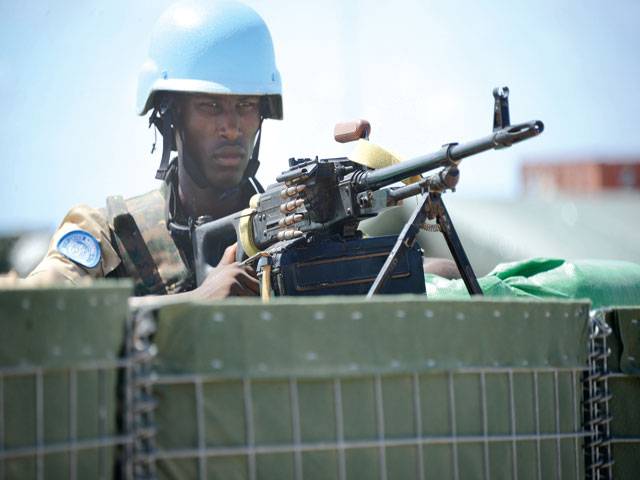MOGADISHU : A special UN military force to protect aid workers deployed for the first time in the war-ravaged Somali capital Sunday, amid a wave of attacks blamed on Al-Qaeda-linked Shebab insurgents.
The 400-strong “defensive” guard force of Ugandan troops, based at the heavily fortified Mogadishu airport, is “mandated to protect UN staff and installations” in the capital.
Despite the government’s insistence that it has improved security, the Shebab continue to carry out bombings - including targeting aid workers - in their bid to overthrow Somalia’s internationally backed but fragile leadership.
Shebab suicide commandos last June blasted their way into a fortified UN base in central Mogadishu, killing 16 people.
“The deployment of the UN Guard Unit is an important step as we continue to expand our operations in support of the Somali people,” UN envoy to Somalia Nicholas Kay said at a ceremony Sunday to mark the start of operations.
Ugandan troops are already in Somalia as a key part of the UN-mandated African Union force AMISOM, which is fighting the Shebab.
The insurgents have been driven out of fixed positions in Somalia’s major towns by 22,000- strong force of AMISOM troops, but still regularly launch guerrilla raids.
Warplanes on Sunday pounded Shebab bases in their stronghold of Jilib in southern Somalia’s Middle Juba region, some 320 kilometres (200 miles) southwest of Mogadishu.
Senior Shebab commander Sheikh Ibrahim Abu Hamze said warplanes had struck the town, but denied any casualties.
“The enemy tried to terrorise the children and women by dropping bombs in the suburbs of the city, but thanks to God, there were no casualties at all,” Abu Hamze told AFP by telephone.
“The mujahedeen fighters have managed to repel the enemy with anti-aircraft weaponry. They have fled.”
It was not immediately clear where the jets were from, but Kenya is part of the AU force and has used its air planes to strike Shebab bases before.
Recent Shebab attacks have targeted key areas of government, or the security forces, in an apparent bid to discredit claims by the authorities that they are winning the war against the fighters.
“We are proud to join the UN family, and will do our utmost to ensure the UN is able to continue its work in Mogadishu under safe and secure conditions,” said Uganda’s deputy army commander Charles Angina.
The UN force in Mogadishu comes amid a wider warnings of the threat of attacks by Shebab fighters or supporters in the wider region, especially in neighbouring Kenya.
The United States on Saturday said it was preparing to cut staff levels at its Nairobi embassy because of the mounting threat of attacks in Kenya by militants.
Earlier this week Britain, France and Australia also issued updated travel advice for their citizens in Kenya, following a string of grenade attacks.
In Somalia, continued conflict, compounded by poor rains and funding shortfalls, are threatening the few gains made since an extreme famine less than three years ago, with the UN and aid agencies warning that the troubled country could be sliding back into a food crisis.
Somalia was the hardest hit by extreme drought in 2011 that affected over 13 million people across the Horn of Africa, with famine zones declared in large parts of the war-ravaged south.
Some 250,000 people, around half of them young children, died in Somalia during that famine, according to the United Nations, which has acknowledged it should have done more to prevent the tragedy.
Among the warning signs today is the fact that seasonal rains crucial for farming and usually lasting from April to June have yet to start in key southern areas of Somalia.
Tuesday, April 16, 2024
UN deploys troops in Somali capital to defend staff

Caption: UN deploys troops in Somali capital to defend staff
10:19 PM | April 15, 2024
Meghan Markle demanding a grovelingly apology for the past
10:38 PM | April 15, 2024
Child Marriage Act: LHC terms difference in gender-based age criteria 'discriminatory'
10:37 PM | April 15, 2024
Elon Musk reveals 'crucial fact' about all-powerful Starship
10:35 PM | April 15, 2024
Aseefa Bhutto Zardari sworn in MNA
10:27 PM | April 15, 2024
Iranian President Raisi to visit Pakistan on April 22
10:26 PM | April 15, 2024
Policing Reforms
April 15, 2024
Storm Safety
April 15, 2024
Deterrence Restored
April 15, 2024
IMF Challenges
April 14, 2024
Security Crisis
April 14, 2024
Suicide awareness
April 15, 2024
Biden’s dilemma
April 15, 2024
Over dependence on technology
April 14, 2024
Education reform call
April 14, 2024
Brain drain
April 14, 2024
ePaper - Nawaiwaqt
Advertisement
Nawaiwaqt Group | Copyright © 2024





